Distinguishing yourself in the construction sector demands more than just stellar projects; it calls for a strategic approach to marketing. With our sample construction marketing business plan template, we seamlessly merge the intricacies of the construction business plan with potent marketing tactics. Designed with industry insights, this template provides a comprehensive roadmap, ensuring both operational excellence and market dominance. It’s the perfect synthesis of business strategy and marketing prowess, paving the way for your construction firm’s success.
10+ Construction Marketing Business Plan Samples
1. Plan Template Bundle
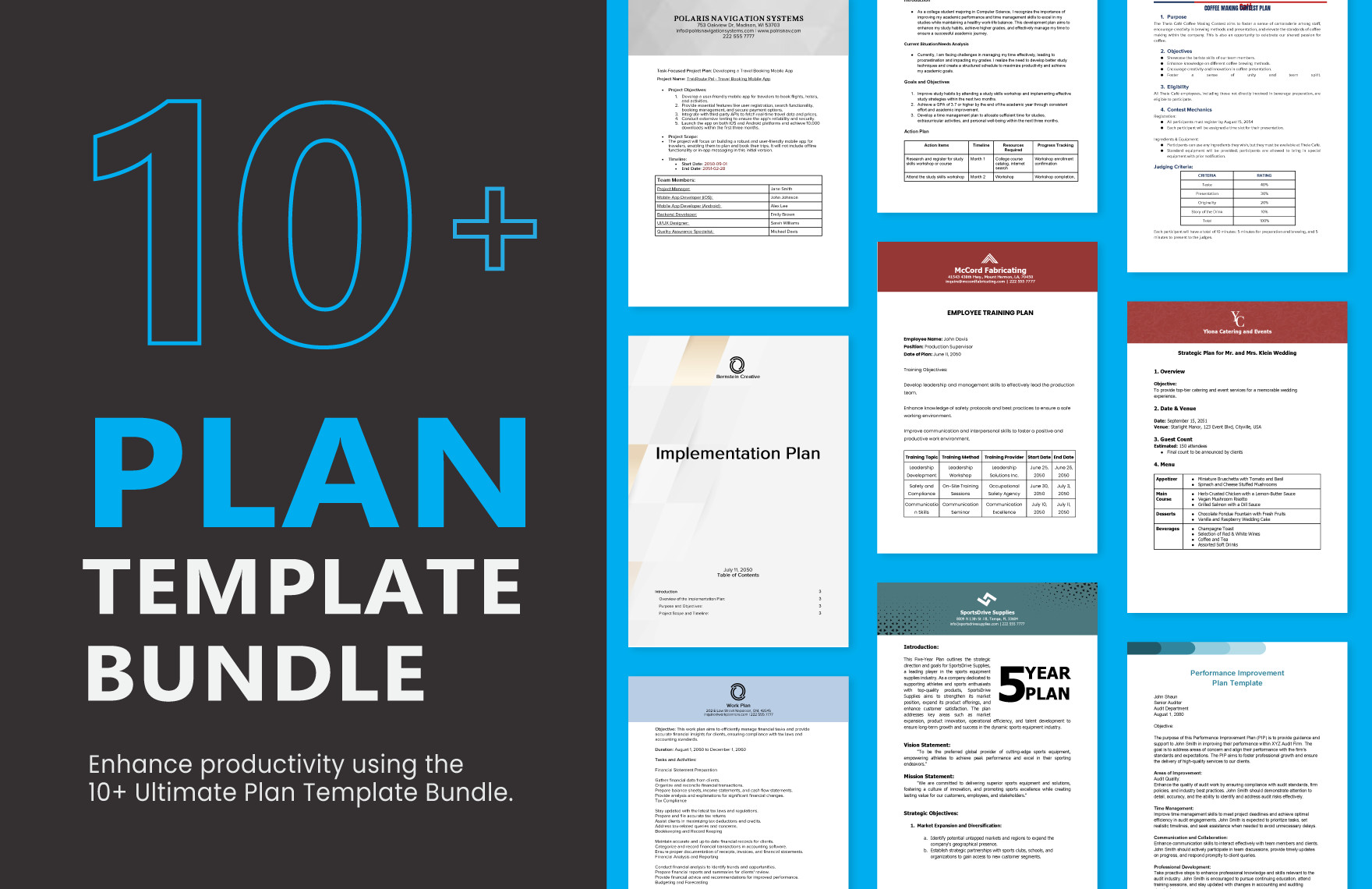
2. Roofing Construction Marketing Business Plan Template
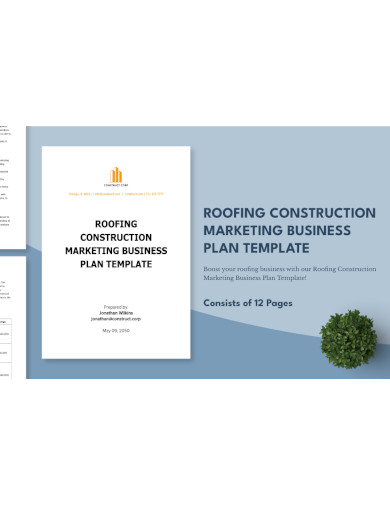
3. Plumbing Construction Marketing Business Plan Template
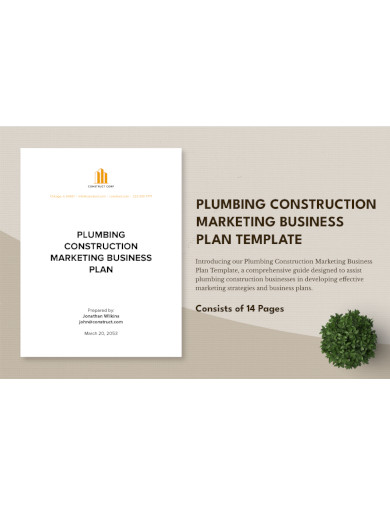
4. Cleaning Construction Marketing Business Plan Template

5. Electrical Construction Marketing Business Plan Template
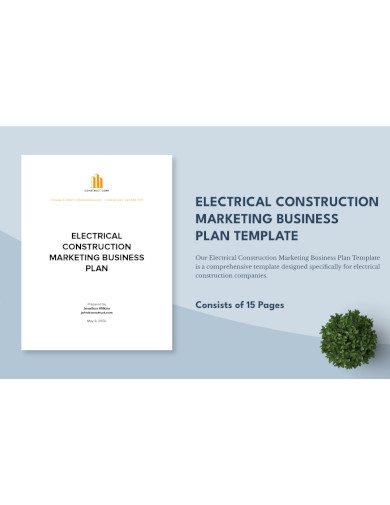
What is the Marketing Plan in Construction?
A marketing plan in construction is a strategic roadmap detailing the efforts a business intends to implement to promote its services, connect with potential clients, and ultimately secure more projects. In an industry as competitive as construction, having a clear marketing strategy can be the difference between thriving and merely surviving.
Why It’s Crucial for the Construction Industry
While the actual building process is the cornerstone of a construction business, marketing is what brings in the clients. Just as one wouldn’t start building without blueprints, entering the market without a well-thought-out plan can lead to missed opportunities and wasted resources.
In the construction realm, reputation and visibility play pivotal roles. A marketing plan ensures you highlight your strengths, showcase your past projects, and effectively communicate the value you bring to potential clients.
Components of a Construction Marketing Plan
Market Analysis: This involves studying the current market landscape, identifying potential competitors, understanding your target audience, and recognizing market trends. Being knowledgeable about the current scenario can help in shaping strategies that resonate.
Objectives and Goals: Clearly defining what you want to achieve helps in guiding your efforts. Whether it’s increasing project inquiries by 20% or expanding into a new city, having clear objectives ensures your team is on the same page.
Tactics and Strategies: These are the specific actions you’ll take to achieve your goals. It could be anything from investing in digital advertising to attending trade shows or hosting webinars about your expertise.
Budget Allocation: Marketing requires investment. By setting a budget, you ensure your strategies are feasible and can be effectively implemented without straining your resources.
Performance Metrics: It’s essential to measure the outcomes of your marketing initiatives. These metrics, whether they’re the number of new inquiries or the engagement rate on your social media posts, provide feedback on what’s working and what’s not.
The Evolutionary Nature of Marketing Plans
It’s vital to understand that a marketing plan isn’t a static document. As market conditions, technologies, and client preferences change, your plan should evolve. Regular reviews and adjustments ensure that your strategies remain effective and relevant.
How to Write a Construction Marketing Business Plan?
Before diving into the intricacies of your plan, begin by defining your construction business’s unique value proposition. Understand what sets you apart from competitors and why clients should choose you. This foundation will guide every subsequent decision in your plan.
Research and Analysis
Market Research: Dive deep into your industry. Understand the current trends, potential growth areas, and emerging challenges. Look at what competitors are doing and identify gaps that your business can fill.
Target Audience Definition: Not every individual or business needs construction services. Identify who your ideal clients are. Understand their pain points, preferences, and what they value most in a construction service.
Strategize
Set Clear Objectives: Define what success looks like for you. It could be in terms of revenue, number of projects, brand recognition, or other metrics. Make these objectives SMART – Specific, Measurable, Achievable, Relevant, and Time-bound.
Tactics Development: Based on your objectives, brainstorm actionable tactics. If your goal is to increase brand visibility, tactics might include launching a website, optimizing it for search engines, or starting a social media campaign.
Budgeting: Assign a budget to each tactic. Ensure you account for all potential expenses, from digital ad spends to printing brochures or attending industry events.
Implementation and Monitoring
Action Plan: Now that you’ve got your strategies in place, create a timeline. Decide when each tactic will be implemented and who will be responsible for it.
Ongoing Review: Regularly check your plan’s progress. Use tools like Google Analytics for digital efforts or conduct monthly reviews to assess if you’re on track to meet your objectives.
Feedback Loop: Ensure there’s a system in place for team members to share feedback. They might provide insights into challenges faced during implementation or suggest more effective tactics.
Refinement
Your first draft won’t be perfect, and that’s okay. The beauty of a marketing plan is its ability to evolve. As you implement, you’ll gain a better understanding of what works for your construction business. Regularly update your plan to incorporate new learnings, ensuring your marketing remains sharp and effective.
6. Infrastructure Construction Marketing Business Plan Template

7. Architectural Construction Marketing Business Plan Template
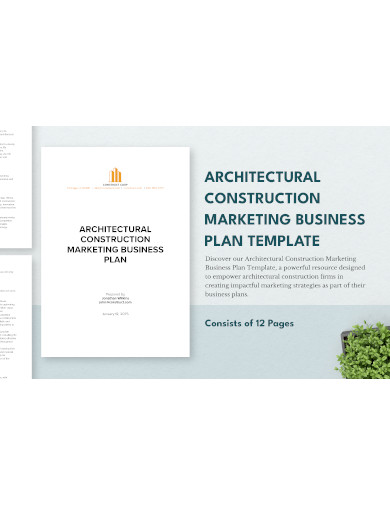
8. Industrial Construction Marketing Business Plan Template
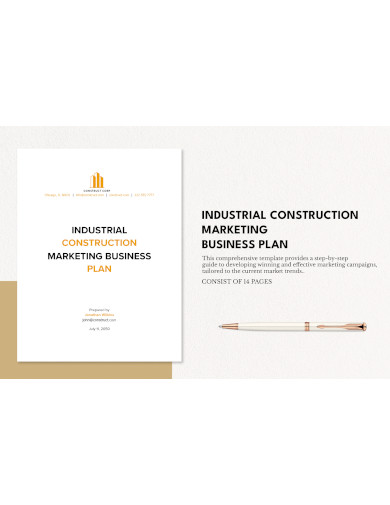
9. Remodelling Construction Marketing Business Plan Template
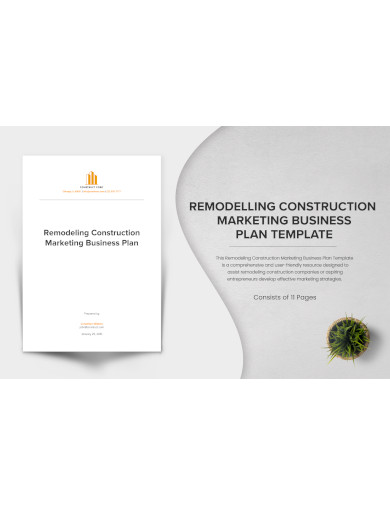
10. Civil Engineering Construction Marketing Business Plan Template
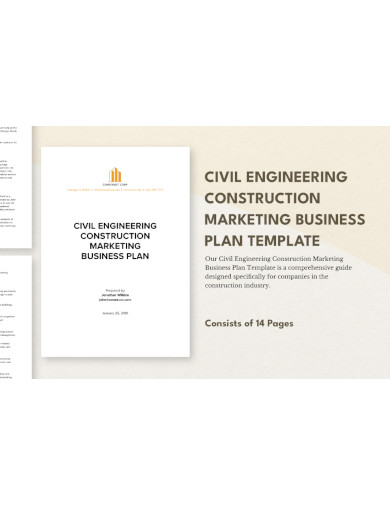
11. General Contractor Construction Marketing Business Plan Template
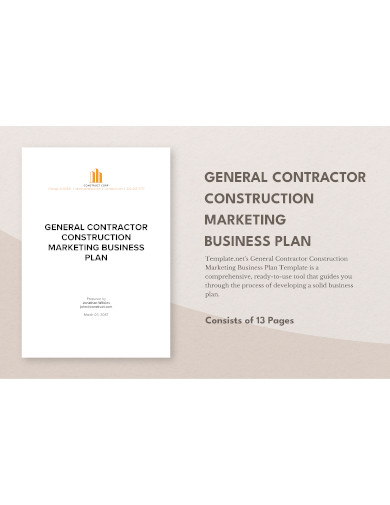
How to Build a Construction Marketing Business Plan?
At the heart of every marketing business plan is the overarching vision of the company. For construction businesses, this might revolve around creating lasting infrastructures, maintaining safety standards, or offering innovative building solutions. Your vision gives direction and purpose to your marketing endeavors.
The Role of Templates in Strategy Development
Utilizing a well-structured template can be a game-changer for businesses, especially in industries like construction where precision is key. Our templates, specifically tailored for the construction industry, act as a scaffold, ensuring that your marketing plan covers all crucial elements. The systematic layout simplifies the process, making sure no key component is overlooked.
Pinpointing Your Unique Selling Proposition (USP)
In the saturated construction market, it’s essential to define what sets your business apart. This could be a specialized construction technique, a commitment to sustainable building, or a notable track record of on-time project completions.
Data-Driven Decision Making
A solid construction marketing business plan thrives on accurate data. Using past project metrics, market research, and competitor analysis, you can make informed choices. By combining your insights with the structured layout of our templates, the process becomes smoother and more efficient, setting you up for success.
Constant Evolution and Adaptation
The construction industry, much like the marketing world, is always evolving. Regularly revisiting and refining your plan ensures that your marketing strategies remain relevant and effective. And with a dependable template in place, updates and adjustments become less cumbersome and more strategic.
Steps to an Effective Construction Marketing Business Plan
Understanding Your Market Landscape
Begin by gauging the current construction market environment. This includes recognizing industry trends, assessing competitors, and identifying potential growth areas. Our templates guide you through this research phase, offering dedicated sections to jot down insights, making sure you start on the right foot.
Setting Tangible Objectives
Once you have a grasp on the market, it’s time to lay down your business objectives. These goals might revolve around revenue, client acquisition, or brand expansion. With clear objectives, you can direct your marketing strategies effectively. Our templates offer spaces for these goals, ensuring they remain at the forefront of your strategy.
Mapping Out Tactics and Strategies
Armed with objectives, the next step involves outlining the specific actions needed to achieve these goals. This could involve social media campaigns, partnerships, or even traditional marketing methods. Using our templates, you can systematically list down and organize these tactics, ensuring a cohesive approach.
Allocating Budget and Resources
Every marketing strategy comes with an associated cost. Whether it’s investing in digital platforms or printing brochures, budgeting is crucial. Our templates provide dedicated sections for financial planning, ensuring your strategies are both ambitious and realistic.
Measuring and Monitoring Performance
A marketing plan’s success is gauged by its results. Establish performance metrics and consistently measure against them. Whether it’s website traffic, lead conversions, or social media engagement, keeping tabs on these metrics helps in refining strategies. Our templates come equipped with sections for these metrics, promoting a performance-driven approach.
Incorporating Feedback for Continuous Improvement
Feedback, both from team members and clients, offers valuable insights. It points towards potential improvements and new opportunities. Ensure you have a mechanism to gather and act on this feedback. Our templates emphasize this aspect, ensuring your plan remains dynamic and responsive.
By following these steps and making optimal use of our comprehensive templates, your construction marketing business plan becomes a powerful tool, driving growth and ensuring lasting industry impact.
Related Posts
FREE 7+ Fashion Business Plan Samples in PDF
FREE 10+ Sprint Planning Samples In MS Word | Google Docs | PDF
FREE 10+ Wedding Planning Samples in MS Word | Apple Pages | Powerpoint | PDF
FREE 9+ Monthly Study Planner Samples in PSD | Illustrator | InDesign | PDF
FREE 9+ Sample Curriculum Planning Templates in PDF | MS Word
FREE 10+ Teacher Development Plan Samples in MS Word | Google Docs | Apple Pages | PDF
FREE 10+ Basketball Practice Plan Samples in PDF
FREE 12+ School Business Plan Samples in PDF | MS Word | Apple Pages | Google Docs
FREE 7+ Client Strategic Plan Samples in PDF | MS Word
FREE 11+ Trucking Business Plan Templates in PDF | MS Word | Google Docs | Pages
FREE 7+ Small Hotel Business Plan Samples PDF | MS Word | Apple Pages | Google Docs
FREE 14+ Bakery Business Plans in MS Word | PDF | Google Docs | Pages
FREE 4+ Yearly Lesson Plan Samples in PDF
FREE 50+ Strategic Planning Samples in Google Docs | Pages | PDF | MS Word
FREE 10+ Construction Project Plan Samples in MS Word | Google Docs | Apple Pages | PDF
